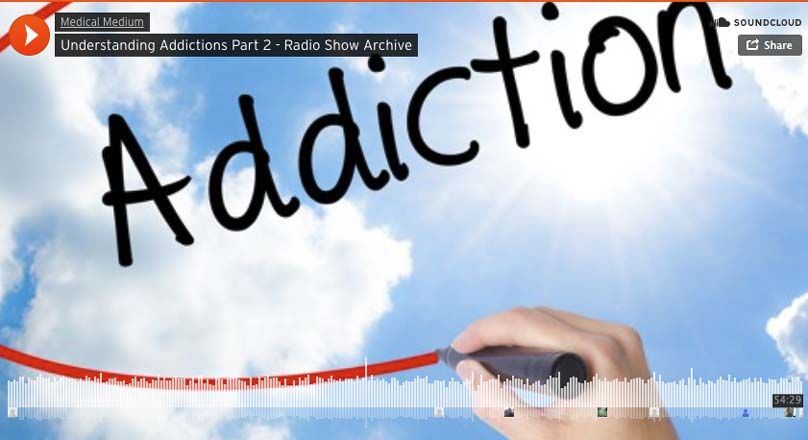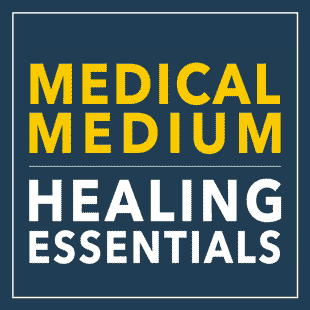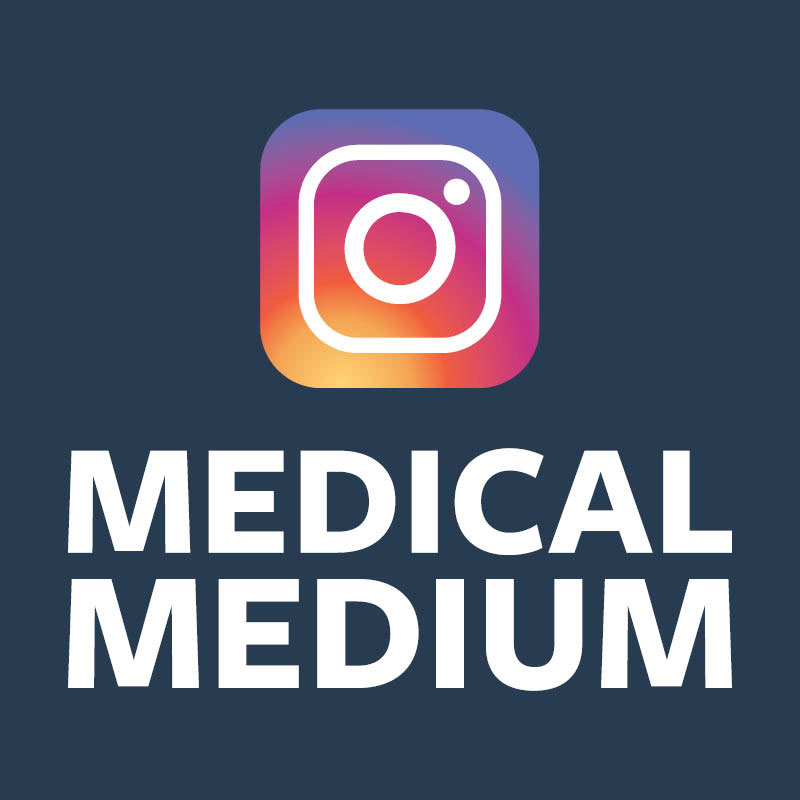Watch: Addictions Part 2

Addictions Part 2
In the first radio show on addictions, I revealed the two foundational roots that play a role in any addiction. The first root is glucose deficiency. If you consume enough glucose from fresh fruits and vegetables, you're much less likely to develop addictions. And, if you're battling an addiction, reversing glucose deficiency can be a powerful step toward recovery.
The second foundational piece is adrenaline. Your own adrenaline can be highly addictive, and it usually plays a large part in any addiction, including to drugs, alcohol, unhealthy sugars, and even danger.
Whether your addiction is relatively minor or life-threatening, the sooner you understand it and put the following recovery protocols into practice, the easier it'll be to find freedom. I hope the knowledge I share will help if you're ever feeling lost or hopeless. You may also want to seek support or spiritual guidance from a counselor or mentor.
Collecting Tools
If you're struggling with a highly destructive addiction, every step you take toward recovery matters. Arming yourself with this information can give you a shield of protection as you fight to reclaim your freedom from whatever addiction you are up against. Implement all the tools you can to combat the addiction:
- Use the information here and in Addictions Part 1 to understand the elements behind your addiction.
- Make healing dietary changes.
- Reach out to family and friends.
- Find a counselor, support group, or rehabilitation center.
Chocolate as a Tool
It might be surprising, but chocolate can be a helpful tool for someone healing from certain addictions. That being said, some people have trouble tolerating chocolate, because even though it has some health benefits, it's also a neurotoxin. If you're really healthy, you may be fine indulging in a chocolate treat every so often. But it's best to avoid chocolate for the time being if you struggle with nervous system issues or neurological problems, including confusion, brain fog, neurological shakes and tremors, neurological aches and pains, tingles, numbness, migraines, neuropathy, fibromyalgia, dizziness, vertigo, ringing in the ears, or any of the symptoms described in the article, Healing Your Neurological System. My book, Thyroid Healing shares a detailed list of neurological symptoms and causes.
If you're working to break an opioid addiction, eating chocolate periodically may help prevent you from turning back to the destructive substance. When I was working with clients at an office twenty-five years ago, I kept a stack of high-quality, dark chocolate bars on hand. Spirit told me that, under the right circumstances, these chocolate bars could help save someone's life.
Around that time, a 19-year-old boy named Cole came into the office with his parents. Cole was struggling with a severe opioid addiction and had already been in and out of rehab multiple times. The addiction was destroying the lives of the whole family. Spirit immediately suggested Cole use chocolate as a weapon against his addiction. Cole was working with a doctor to wean off the drugs, and I suggested he eat a sizable portion of chocolate anytime the weaning process felt unbearable. I offered him a chunk of chocolate during the consultation, and he smiled and remarked on its tastiness. His parents were surprised to see a smile from their son, who they said hadn't smiled in years. The parents were also surprised at Cole's sudden optimism towards recovery as our session progressed. Using chocolate as a crutch during this trying time worked. Within three weeks, my client was clean, and he went on to live a drug-free life.
Salt Addiction
Do you know someone who can never seem to get enough salt? If someone's suffering from a sodium addiction, it's likely they're desperately in need of mineral salts for their adrenal glands and the neurotransmitters in their brain. This addiction can arise if someone's overtaxing their adrenals, which can leave their neurotransmitters craving the mineral salts that protect the adrenal glands.
Unlike refined salt, sea salt, or Himalayan salt, the mineral salts found in certain fruits, leafy greens, and vegetables can play a significant role in breaking an adrenaline addiction and revitalizing the adrenals. Celery juice, plus spinach and other leafy greens are just some of the foods that are rich in undiscovered varieties of sodium that deeply nourish the body. Although you don't have to cut Himalayan salt or high-quality sea salt out of your diet completely, use a moderate amount and make sure your diet is brimming with foods that are naturally rich in mineral salts, like the celery juice.
Supporting and protecting your adrenals is a critical step for anyone seeking to prevent or break an addiction. If you're working to heal from a salt addiction, incorporate adrenal snacks into your daily diet. Eating a small meal, such as an adrenal snack, every hour to hour and a half can be incredibly beneficial.
Anorexia & Bulimia
When mercury and other heavy metals interfere with neurotransmitters in certain parts of the brain, bulimia or anorexia can develop in certain individuals. If these heavy metals are removed through the heavy metal detox or if brain tissue develops in a particular way that bypasses the heavy metals, you might still struggle with an addiction to your own adrenaline that manifests as an eating disorder.
One of the reasons it can be so hard to heal bulimia is because of the adrenaline surge people experience before they purge. This adrenaline rush can be similar to a powerful drug in its euphoric quality. Someone struggling with anorexia may experience a surge of adrenaline when they look at food, especially if they've suffered abuse around food in the past. In this instance, the surging adrenaline acts similar to a drug, and the person may quickly lose their appetite.
This information on adrenaline and adrenaline addiction hasn't yet been discovered. I brought it to light in my books, Medical Medium, Life-Changing Foods, Thyroid Healing, Liver Rescue and Celery Juice, in this article and on my radio shows. While many people believe eating disorders stem from emotional or sexual abuse, it's important to understand that these horrible traumas are severe triggers that may cause someone to develop an eating disorder, but they are not the cause. It's usually a combination of toxic heavy metals in the brain and an addiction to the adrenaline that surges each time an eating disorder is acted on that causes people to continue struggling.
Sugar Addiction & The Role of Fat
Your brain and liver need the glucose from fruits and vegetables to survive and thrive. Unfortunately, some people turn to refined sugar-filled treats instead and wind up with an addiction to unhealthy sugars. People stay addicted to these unhealthy sugars partly because of the unhealthy fat most sugary treats contain. (Ice cream is one example).
Foods that are high in unhealthy fat don't allow the sugar to flood the places it's needed, including the cells, muscles, heart, brain, and liver. If you feel addicted to sweets and treats, you likely need to replenish the healthy glucose in your brain. If you continue to fill your body with unhealthy, sugary treats you'll never be satisfied, and you might even exacerbate the addiction.
If you swap your treats for healthy, glucose-rich foods, such as dates, apples, and raw honey, your brain will start to receive the kind of sugar it needs. Then, your addiction to the wrong kind of sugar will likely disappear. Carrying a bag of dates, dried apricots, or figs with you can help with conquering cravings that arise when you're out.
It's also important to avoid or limit the wrong kinds of fats. These fats—and even too much healthy fat—can halt the restoration of glycogen deposits in the brain and liver. I discuss this in detail in my book, Liver Rescue.
Omega 3s are important, but receiving them from the right sources is critical for proper glucose absorption in the body. There's misinformation that the brain is largely made of fat, but this is false. The brain is largely made out of carbohydrates, and it contains only micro deposits of fats. These micro deposits are made of omega 3s and other oils, many of which medical science and medical research have yet to discover.
You can get the omega 3s and all of the other micro fats you need from watermelon seeds, hemp seeds, butter leaf lettuce, blackberry seeds, sesame seeds, tahini, tomato seeds, and more, along with a plant-based EPA DHA. Turning to these foods can prevent you from losing glucose reserves in your brain that are so critical for freedom from addictions and to help protect you from Alzheimer's disease and other neurological problems. If you're trying to break any kind of addiction, keep the fats in your diet low—so the glucose can easily enter your cells—whether you're a meat eater, pescatarian, vegetarian, or vegan.
Addiction to Cigarettes
Although nicotine is an addictive drug, and that's partly why many people are hooked on cigarettes, there are a few other reasons it's challenging to break this addiction.
One reason is that you're likely smoking in part because of the adrenaline that floods your system when you're an active smoker. Before you even put a cigarette to your lips, the anticipation can cause adrenaline to rush through your body. The more time you wait in anticipation of the next cigarette, the more adrenaline flows through your system. Often when people quit smoking, their appetite appears to ramp up. This is largely because those cigarette-activated adrenaline surges finally begin to calm down.
Another reason people become addicted to smoking is it actually makes the smoker alkaline for a very brief moment while they're smoking. This may be shocking to learn, but it's a truth that has yet to be uncovered by science. As the tobacco in a cigarette turns from fresh tobacco to burnt tobacco, a chemical compound develops. Once the chemical ignites, it goes straight to the brain and gives you a brief alkaline hit that's far more addictive than the nicotine found in cigarettes. Unfortunately, following this short wave of alkalinity, your body becomes incredibly acidic. As a result, you're likely to crave another cigarette soon after in order to receive an additional alkalizing hit.
The Medical Medium Cigarette Pack Trick
This trick includes high-quality chocolate, which isn't always the best food choice but may come in handy for people who are working to quit smoking. Take two packs of cigarettes, empty one pack entirely, and fill the second pack with a smaller amount of cigarettes than you normally smoke. Break apart a high-quality chocolate bar, and fill the emptied pack with small pieces of chocolate. Whenever you'd take your usual cigarette break and you feel an adrenaline rush coming on as you ready yourself for a smoke, take a piece of chocolate out of the empty pack and pop one or two small pieces into your mouth. Don't chew or swallow them right away, instead leave them in your mouth until they melt completely. Because nicotine is aromatic, if you've put the chocolate pieces in the cigarette box ahead of time, the chocolate will have soaked up some of the nicotine.
During your next break, you can have a cigarette from your box of fewer cigarettes. Keep both packs on you throughout the day, and continue to cut down on cigarettes at a pace that feels manageable.
Walking Off Your Smoking Habit
A second trick for quitting is to smoke only when you're walking outside. Because you're walking, you'll likely take fewer drags of your cigarette, so you won't be getting as many addictive hits of nicotine. You'll take in more oxygen because you're walking, and you may even experience greater calm due to the gentle movement. The adrenaline flooding your body from the cigarette will also be better used when you're walking as opposed to when you stand and smoke. Also, because it's a little more challenging to walk and smoke versus stand or sit and smoke, you may be less inclined to pick up a cigarette as frequently.
In sum, use these tips to quit smoking:
- Try the chocolate and walking techniques.
- Bring in foods that support your healing, such as the five Medical Medium Heavy Metal Detox foods: spirulina, barley grass juice powder, Atlantic dulse, cilantro, and wild blueberries.
- Try these supplements: California poppy, GABA, magnesium threonate, lemon balm, passionflower, 5HTP, and ALA.
- Lean on the positive support of family and friends, and know that it is possible to break your addiction!
The Spiritual Side of Addictions
Negative spiritual energy can play a role in addiction. While you're fighting to overcome an addiction, it can be invaluable to call on some of the angels for guidance and support. There's an entire chapter dedicated to angels that can support you in Medical Medium and Life-Changing Foods.
Moving Forward
Planet Earth is a beautiful place, but it can be a stressful place to live in the 21st century. Stress, along with any hardships or losses you've had to endure, can play a role in the addictions you face. Know that you're not alone, and you can regain your strength and conquer whatever battle you may be up against. Hopefully this information and the information found in the first “Addictions” radio show will offer you hope, encouragement, and strength to keep going. I believe in you and support you every step of the way.
This item posted: 07-Mar-2017
The information provided on this Site is for general informational purposes only, to include blog postings and any linked material. The information is not intended to be a substitute for professional health or medical advice or treatment, nor should it be relied upon for the diagnosis, prevention, or treatment of any health consideration. Consult with a licensed health care practitioner before altering or discontinuing any medications, treatment or care, or starting any diet, exercise or supplementation program. Neither Anthony William nor Anthony William, Inc. (AWI) is a licensed medical doctor or other formally licensed health care practitioner or provider. The content of this blog and any linked material does not necessarily reflect the opinions of Anthony William, AWI or the principal author, and is not guaranteed to be correct, complete, or up to date.
Thanks for printing this post. For more, visit www.medicalmedium.com


